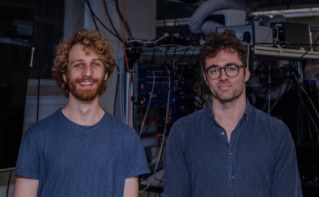The winner of the 2019 Physics World Book of the Year tackles the complex and ever-evolving subject of the emergence of life, the universe and everything

The writer, broadcaster and physicist Paul Davies has won the 2019 Physics World Book of the Year award for The Demon in the Machine: How Hidden Webs of Information are Solving the Mystery of Life by Paul Davies.
The book tries to answer some of humankind’s biggest questions, including the nature of life, how and why it emerges, and what distinguishes the living from the non-living. Far from being overwhelmed by tacking these most fundamental of questions, in the book Davies explains how matter (living and otherwise), information and entropy interact.
Physics World based its choice on the 42 books that it reviewed over the last 12 months, using the same three criteria that have been in place since Physics World launched the award 10 years ago in 2009 – namely that the books must be well written, novel and scientifically interesting to physicists.
The Demon in the Machine is the culmination of decades of research done by Davies’s team at the Beyond Center for Fundamental Concepts in Science at Arizona State University, US. Davies’ goal is to bring together physics, chemistry, molecular biology, genomics and information theory, to truly explain our universe and our place in it.
The book deals with established physics concepts (such as the second law of thermodynamics), but also delves into Davies’ thoughts on topics such as the emergence of human consciousness (while making sure the reader is aware of what is speculation). Readers, though, are likely to be left with more questions than clean-cut answers about the laws of nature.
“Just in the last 10 years or so, I suppose, I’ve begun to see a confluence of different subjects. Partly, this is advances in nanotechnology, said Davies when he spoke to Physics World earlier this year. “Partly, it is a convergence of physics and computing and biology and information theory – all these subjects are coming together in the realm of large molecules or tiny machines, where life and chemistry and physics all intersect. That’s the new frontier – the physics of the very complex, where the traditional subject boundaries melt away.”
For Davies, matter, life and information are all tightly interwoven, and understanding these complex connections is what will eventually give us a true theory of everything. This book is not a light read, instead offering readers a challenging, but ultimately extremely captivating, fruitful and enjoyable read. For such a complex topic, Davies is a clear and lucid guide– and you can’t help but be sucked in by demons, double-headed worms and the universe at large.
To know more about Davies’ book, and hear his reaction to the award, as well as his predictions for the future, listen to our December Physics World Stories podcast, which also features a discussion of the other books on our shortlist.
Shortlist
The other nine titles in our shortlist (in no particular order) are:
The Moon: a History for the Future by Oliver Morton
The Case Against Reality: How Evolution Hid the Truth from Our Eyes by Donald D Hoffman
Fire, Ice and Physics: the Science of Game of Thrones by Rebecca C Thompson
Underland: a Deep Time Journey by Robert Macfarlane
The Second Kind of Impossible: the Extraordinary Quest For A New Form of Matter by Paul J Steinhardt
Superior: the Return of Race Science by Angela Saini
Einstein’s Unfinished Revolution: the Search for What Lies Beyond the Quantum by Lee Smolin
The Universe Speaks in Numbers: How Modern Maths Reveals Nature’s Deepest Secrets by Graham Farmelo
Catching Stardust: Comets, Asteroids and the Birth of the Solar System by Natalie Starkey



